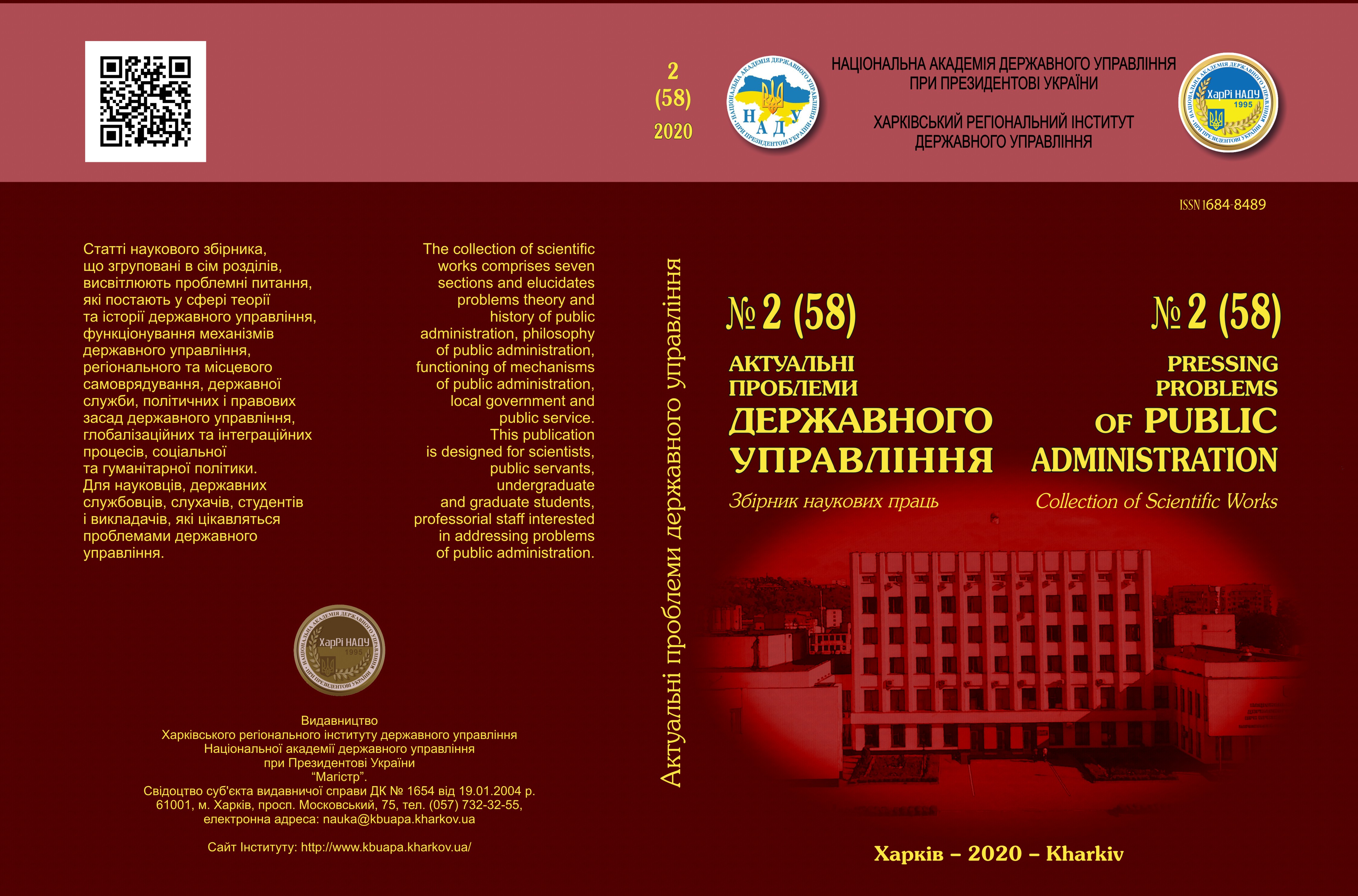THE ETHICAL INFRASTRUCTURE AND ITS ROLE IN THE PROCESS OF FORMING THE MORAL AND ETHICAL BACKGROUND OF PUBLIC SERVICE
Abstract
The article is devoted to the study of the ethical infrastructure of the public service and the definition of its main elements. Different approaches to the definition of “ethical infrastructure” are revealed. Three main systems of the ethical infrastructure are analyzed: formal, informal and leadership.
The formal system includes standard actions that provide a more formal and clear description of ethical principles in the public service (ethics code, training programs, availability of special bodies, etc.). Informal systems proceed through informal communication channels (informal conversations about ethics, informal trainings, recognition of informal leaders, etc.). As for leadership (this system is presented by organizational leaders), it plays an important role in formal as well as informal communications. After all, thanks to leaders in formal systems the establishment of standards of the ethical behavior and the transfer of core values of the organization are performed. And in informal communication, the mission of the leader is to be a model of high ethical standards.
The main elements of the ethical infrastructure are identified, they include: the political will, legislation, ethics code, reporting and supervision mechanisms, public control, professional socialization, coordinating bodies, conditions of the public service support. The main elements of the ethical infrastructure are ranked. This ranking is based on our own sociological research. It was found that special attention should be paid to such an element of the ethical infrastructure as professional socialization, in particular, professional and ethical education of public servants, as its respondents consider it the most important in the process of raising moral and ethical standards of public service. This is due to the fact that modern civil servants need constant improvement of their knowledge and skills.
At the same time, we believe that a favorable moral and psychological climate in the public service can be achieved only if all these elements of the ethical infrastructure will work mutually. Thus, the ethical infrastructure consists of mechanisms, tools, conditions and special bodies that should promote high standards of conduct for public servants. Every function and element of the ethical infrastructure is very important in creating a favorable climate in the public service.
Downloads
References
Vasylevska, T.E. (2008). Osobystisni vymiry etyky derzhavnoho sluzhbovtsia [Personal dimensions of civil servant ethics]. Kyiv [in Ukrainian].
Vojtenko, A.B., Yakobchuk, V.P. (2019). Suchasna politychna elita v Ukraini: osoblyvosti formuvannia. Transformatsiia ukrainskoho suspilstva ta joho elit u konteksti tsyvilizatsijnoho rozvytku Yevropy. I.A. Melnychuk (Ed.). Zhytomyr: Ruta [in Ukrainian].
Koltunov, O. (2010) Etychna infrastruktura derzhavnoi sluzhby Ukrainy: zahalna kharakterystyka. Naukovi zapysky Instytutu politychnykh i etnonatsionalnykh doslidzhen im. I.F. Kurasa NAN Ukrainy, 6 (50), 353–364 [in Ukrainian].
Lakhyzha, M., Cherchatyj, O. (2007). Etychni zasady u diialnosti publichnoi administratsii Polschi. Derzhavne budivnytstvo. – State Formation. 1 (2), 1–11. URL: http://nbuv.gov.ua/UJRN/DeBu_2007_1%282%29__63 [in Ukrainian].
Malimon, V.I., Shevchenko, N.P. (2015). Aktualizatsiia etychnykh kodeksiv v konteksti modernizatsii systemy derzhavnoho upravlinnia. Naukovo-informatsijnyj visnyk Ivano-Frankivskoho universytetu prava imeni Korolia Danyla Halytskoho. Ivano-Frankivsk, 11, 79–85 [in Ukrainian].
Rudakevych, M.I. (2007). Formuvannia etyky derzhavnykh sluzhbovtsiv v umovakh demokratyzatsii i profesionalizatsii derzhavnoho upravlinnia [Formation of ethics of civil servants in the context of democratization and professionalization of public administration]. Extended abstract of Doctor’s thesis. Kyiv [in Ukrainian].
Shtyrov, O. (2007). Stvorennia etychnoi infrastruktury derzhavnoi sluzhby v Ukraini na suchasnomu etapi rozvytku. Aktualni problemy derzhavnoho upravlinnia. Odesa: ORI NADU, 2 (30), 186–193 [in Ukrainian].
Ann, E. Tenbrunsel, Kristin Smith-Crowe, and Elizabeth E. (2003). Umphress Building Houses on Rocks: The Role of the Ethical Infrastructure in Organizations. Social Justice Research, 16, 3, 285–307. doi: 10.1023/A:1025992813613.
Bogucka, I., Pietrzykowski, T. (2012). Etyka w administracji publicznej. LexisNexis. Warszawa, 113.
Hajdys, D. (2016). Etyka w administracji publicznej. Etyka w relacjach instytucji finansowych z gospodarstwami domowymi, ser. Ekonomia. Łódź: Wydawnictwo Uniwersytetu Łódzkiego,
–308.
Janez Stare, Maja Klun (2016/2017). An Analysis of the Ethics Infrastructure and Ethical Climate in Slovenian Public Administration. The NISPAcee Journal of Public Administration and Policy, IX, 147–164. doi: 10.1515/nispa-2016-0018.
OECD (1996). Ethics in The Public Service. Current Issues and Practice, Public Management Occasional Papers, 14, 63. URL: http://dspace.uni.lodz.pl:8080/xmlui/bitstream/handle/11089/20350/%5B287%5D_308_Hajdys.pdf?sequence=1&isAllowed=y.
Parker, C., Evans, A., Haller, L., Mire, S. Le and Mortensen, R. (2008). The Ethical Infrastructure of Legal Practice in Larger Law Firms: Values, Policy and Behaviour. UNSW Law Journal, 31 (1), 158–188.

